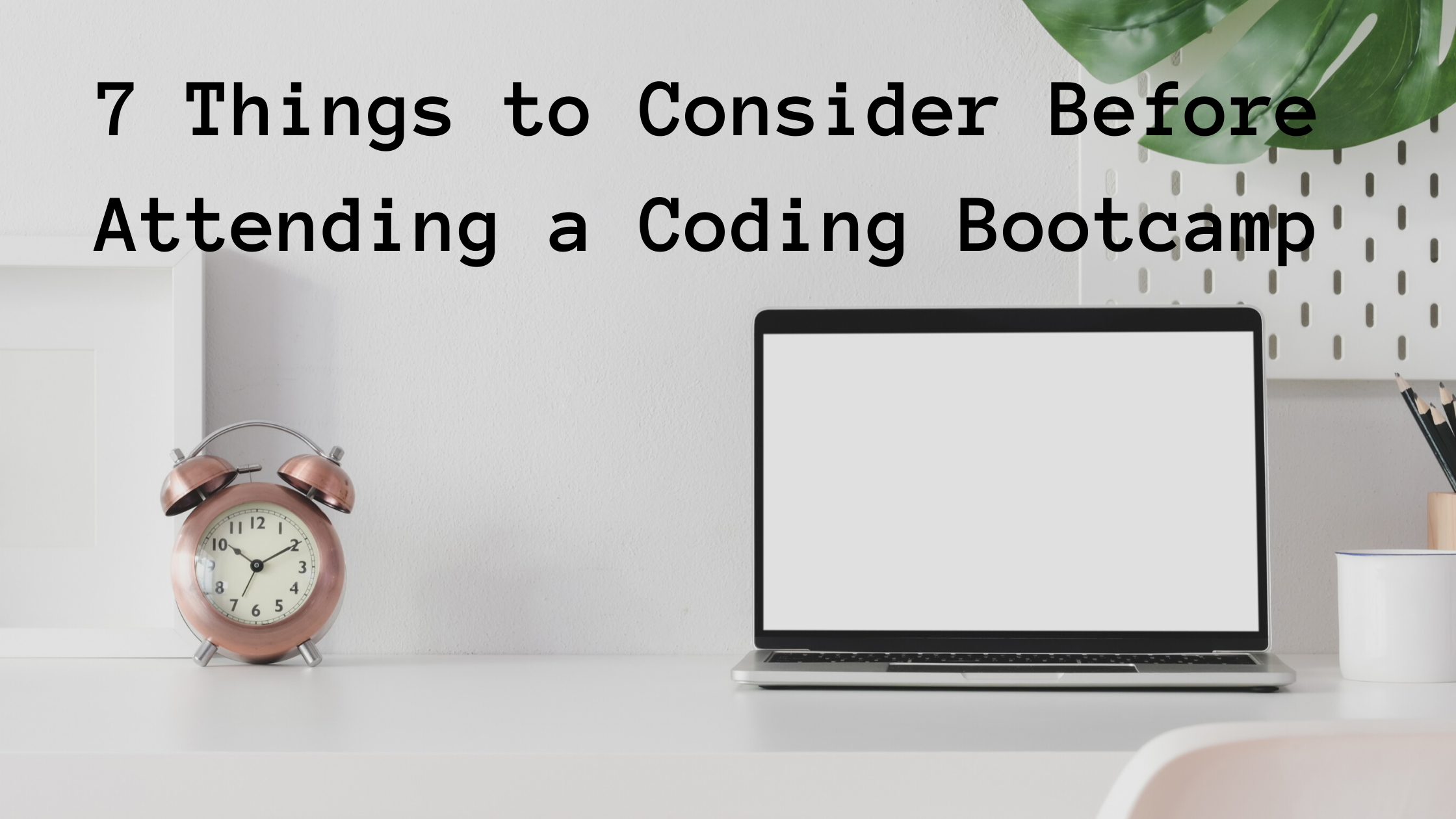7 Things to Consider Before Attending a Coding Bootcamp
 freeCodeCamp
freeCodeCamp
By Nehemiah Kivelevitz
Coding bootcamps are becoming more and more popular, and for good reason. Just picture yourself earning a six-figure salary, at a great company, with any benefits you can dream up – and all of this only after 3 - 6 months of training.
The bigger coding bootcamps will tout their graduates landing wonderful jobs at Google, Facebook, Microsoft, Apple, and others. It would be hard to find someone who wouldn’t dream about such a work opportunity.
Unfortunately, the majority of the time this is just a dream and nothing more.
As a graduate of a coding bootcamp myself I’d like to give my two cents on the subject. Many of my friends and acquaintances who are considering attending a coding bootcamp have reached out to me, so I wanted to list some things to consider before pulling the trigger on that $10,000+ investment.
Make sure you enjoy coding
It should go without saying that before making any big commitment you should make sure it’s a good fit for you.
I'd recommend spending a lot of hours coding on your own before jumping into a bootcamp, as much as you can. If you are wondering how much time you should spend coding before deciding, I would recommend at least 100 hours.
This has two benefits: firstly, it allows you to make sure you really enjoy coding. Secondly, you may come to realize you're able to learn on your own.
You can start yourself off with free resources like freeCodeCamp, Code Academy, or countless YouTube videos.
Don’t do it just for the money
If you’re just after the money, do some research into how much bootcamp graduates are making in their first job out of the bootcamp.
Maybe you have a friend who made a lot of money straight out of their coding bootcamp, but whatever number you have in your head probably does not match the salary most coding bootcamp graduates make.
Course Report released a wealth of information on the topic of salaries for coding bootcamp graduates. Graduates from Hack Reactor in San Fransisco earned a median salary of $115,000, whereas graduates from Tech Elevator in Cincinnati were earning only $55,000. According to PayScale the average salary in Cincinnati is $64,000.
And keep in mind that there are other ways to earn a large salary without coding. Some other professions you can get into without having a degree: Project Manager, Designer, Marketer, or Entrepreneur (if you're a self starter).
Check the job boards
Do your own research regarding junior/entry level dev positions that are out there. The more popular bootcamps and self teaching becomes in the coding community, the fewer jobs there are out there.
Take a look at LinkedIn, Glassdoor, and Indeed, do a search for 'entry level developer' or 'junior developer', and see how many results you get in your area. Then take a look at the description and see if they're expecting someone with 1-2 years experience, or if they are accepting no prior experience as well.
I'm not saying jobs don’t exist, but it’s worthwhile to see what the market looks like. I personally know a lot of people who simply did not find development jobs after months (or more) of searching. If I recall correctly, approximately 50% of my cohort secured developer jobs after graduating our bootcamp.
Don’t quit your day job
I almost never recommend that someone to quit their job if they already work in tech. It’s possible to advance within your own company into a development position by learning on the side.
This will, of course, depend on your company, but a nice advantage is that you’re still getting a paycheck throughout this process.
How to transition in your current company:
- Start learning to code in your spare time
- Talk to the developers in your company, including your CTO if you can. Learn what technology stack they are using, and start learning those technologies.
- Mention to your befriended developers that you've been learning to code, maybe show them a project you have been working on.
- Ask your manager, or a hiring manager in the development team, if they have any projects in the company you could work on.
- If step #4 worked out, you have solid footing to move into a full-time development position from there.
Although I didn't use these exact steps, I and former co-workers of mine used similar techniques to transition into development from entry level QA positions.
Take success rates with a grain of salt
Whatever placement rate the program tells you they have, assume the numbers are being mixed in with other jobs “in the field”, not just developer placement success.
For example, a given coding bootcamp might consider people landing a job in QA, product management, or technical writing a successful placement.
In fact Flatiron School boasts a very impressive 93% employment rate, whereas the bootcamp I attended, had closer to 70% I believe. However, Flatiron School discloses that 19% of those who found employment were not doing development, but some other form of technical disciplines.
Your first job won’t be your dream job
Your first job will likely not be at Google, Microsoft, or Apple. In fact you might need to take a position at a company you’re really not psyched about just so you can get experience under your belt.
In the Flatiron School cited quoted above, 70% of the graduates took jobs in small (50 or fewer employees) to medium (51-500) sized companies.
Consider cheaper alternatives
I mentioned above that there are great free resources to get you started. But even in the paid realm, there are cheaper alternatives.
Udemy has a plethora of resources for learning any area of coding you might want to explore. Udacity, Coursera, Scrimba, and many other platforms have free and paid courses you can take as well.
A Bootcamp might still be a good fit for you
I’m not trying to discourage anyone from attending a coding bootcamp. It might be the perfect fit for you if you:
- have the time to commit
- thrive in an in-person framework for learning
- have the money to spend
- are sure you like coding
- have realistic expectations
Want to chat more about coding bootcamps or programming? Find me on Twitter: @NehemiahKiv
Subscribe to my newsletter
Read articles from freeCodeCamp directly inside your inbox. Subscribe to the newsletter, and don't miss out.
Written by

freeCodeCamp
freeCodeCamp
Learn to code. Build projects. Earn certifications—All for free.